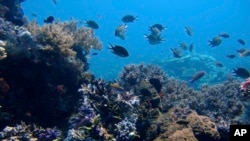ອົງການອຳນາດການປົກຄອງພື້ນທະເລສາກົນຂອງ ສະຫະປະຊາຊາດ ຈະພົບປະກັນໃນວັນຈັນມື້ນີ້ ເພື່ອພິຈາລະນາກົດລະບຽບໃໝ່ ທີ່ອະນຸຍາດໃຫ້ບໍລິສັດຕ່າງໆຂຸດຄົ້ນແຮ່ທາດຈາກພື້ນມະຫາສະໝຸດ, ເຖິງແມ່ນຈະມີຄວາມເປັນຫ່ວງຍິ່ງຂຶ້ນ ກ່ຽວກັບ ຄວາມສ່ຽງດ້ານເສດຖະກິດ ແລະ ສິ່ງແວດລ້ອມກໍຕາມ.
ບັນດາຜູ້ສະໜັບສະໜູນເວົ້າວ່າການຂຸດຄົ້ນແຮ່ທາດຢູ່ທະເລເລິກ ຈະຊ່ວຍຂະຫຍາຍການສະໜອງວັດຖຸດິບຕ່າງໆຄື cobalt ແລະ nickel, ເຊິ່ງມີຄວາມຕ້ອງການສຳລັບການສົ່ງຕໍ່ພະລັງງານໃນໂລກ, ແຕ່ບັນດານັກວິຈານກ່າວວ່າ ມັນຈະທຳລາຍລະບົບນິເວດ ແລະ ຂັດຂວາງເສັ້ນທາງການອົບພະຍົບຂອງສັດ.
ຫຼາຍເຖິງ 27 ປະເທດໄດ້ຮຽກຮ້ອງໃຫ້ຢຸດກິດຈະກຳດັ່ງກ່າວຢ່າງໜ້ອຍຊົ່ວຄາວ, ແລະ ເກາະ ຮາວາຍ ໃນອາທິດທີ່ຜ່ານມາໄດ້ກາຍເປັນລັດທີ 4 ໃນມະຫາສະໝຸດປາຊີຟິກຂອງ ສະຫະລັດ ທີ່ໄດ້ປະກາດການຫ້າມຮອບດ້ານ.
ໃນການປະຊຸມຢູ່ທີ່ນະຄອນຫຼວງ ຄິງສຕັນ ປະເທດ ຈາໄມກາ, ຈົນຮອດວັນທີ 26 ກໍລະກົດນີ້, ສະພາ ISA ທີ່ມີສະມາຊິກ 36 ປະເທດຈະເຈລະຈາກັນ ກ່ຽວກັບຮ່າງສະບັບຫຼ້າສຸດຂອງ “ລະຫັດການຂຸດຄົ້ນແຮ່ທາດ” ທີ່ມີການລໍຖ້າມາດົນນານ,” ເຊິ່ງຖືກອອກແບບມາເພື່ອຄວບຄຸມການຄົ້ນຫາ ແລະ ຂຸດຄົ້ນບໍ່ແຮ່ຢູ່ພື້ນມະຫາສະໝຸດ.
ທ່ານ ປຣາດີບ ຊິງ, ນັກຊ່ຽວຊານດ້ານການປົກຄອງມະຫາສະໝຸດ ຢູ່ສະຖາບັນ ພົດສດາມ ຂອງ ເຢຍຣະມັນ ກ່າວວ່າ “ຂ້າພະເຈົ້າຄິດວ່າມັນຈະມີຄວາມຊັດເຈນຂຶ້ນຢູ່ກອງປະຊຸມນີ້ ທີ່ມັນຈະຍັງໃຊ້ເວລາອີກດົນຢູ່.” ເຊິ່ງທ່ານເວົ້າອີກວ່າ ຫຼາຍປະເທດຍັງຄົງບໍ່ເຫັນພ້ອມກັນ ກ່ຽວກັບ ຂໍ້ຄວາມສຸດທ້າຍ.
ຫຼາຍປະເທດແມ່ນເປັນຫ່ວງວ່າລະຫັດດັ່ງກ່າວແມ່ນຟ້າວຝັ່ງເຮັດຂຶ້ນມາໂພດ ໂດຍປາສະຈາກການກວດສອບທີ່ເໝາະສົມ ແລະ ຢາກຈະເຮັດໃຫ້ຂັ້ນຕອນດັ່ງກ່າວຊ້າລົງ, ອີງຕາມການກ່າວຂອງທ່ານ ຊິງ.
ໃນຂະນະທີ່ຫຼາຍປະເທດມີຄວາມເປັນຫ່ວງ ກ່ຽວກັບ ຄວາມສ່ຽງດ້ານສິ່ງແວດລ້ອມ, ປະເທດອື່ນໆກໍຍັງຊອກຫາຄວາມກະຈ່າງແຈ້ງ ກ່ຽວກັບ ວິທີການດຳເນີນການຂຸດຄົ້ນແຮ່ທາດໃນທະເລເລິກຈະຖືກແບ່ງປັນແນວໃດ.
ອ່ານຂ່າວນີ້ເປັນພາສາອັງກິດ
The United Nations' International Seabed Authority (ISA) will meet on Monday to consider new rules allowing firms to extract minerals from the ocean floor, despite mounting concerns about the economic and environmental risks.
Supporters say deep sea mining will help boost supplies of raw materials like cobalt and nickel, which are needed for the global energy transition, but critics say it could destroy ecosystems and disrupt migratory routes.
As many as 27 countries are calling for at least a temporary halt of activities, and Hawaii last week became the fourth Pacific U.S. state to issue a comprehensive ban.
Meeting in Kingston, Jamaica, until July 26, the 36-member ISA council will negotiate the latest draft of a long-awaited "mining code", designed to regulate the exploration and extraction of "polymetallic nodules" and other deposits on the ocean floor.
"I think it will become very clear at this session that there is still a long way to go," said Pradeep Singh, an ocean governance specialist at Germany's Potsdam Institute, saying that countries were still divided over the final text.
Many are concerned the code is being rushed through without proper scrutiny and want to slow the process down, Singh said.
While many are concerned about environmental risks, others are also looking for clarity about how proceeds from deep sea mining will eventually be shared.





ຟໍຣັມສະແດງຄວາມຄິດເຫັນ